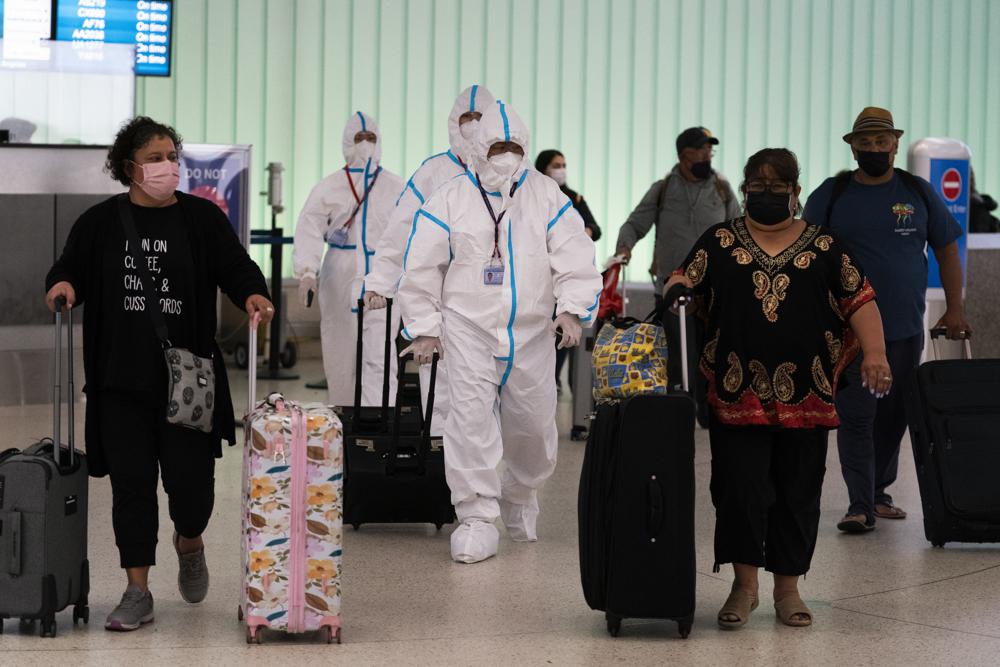
The U.S. recorded its first confirmed case of the omicron variant Wednesday — a person in California who had been to South Africa — as scientists around the world raced to establish whether the new, mutant version of the coronavirus is more dangerous than previous ones.
Dr. Anthony Fauci, the United States’ top infectious disease expert, made the announcement at the White House.
“We knew it was just a matter of time before the first case of omicron would be detected in the United States,” he said.
At least 23 other countries have reported omicron infections, according to the World Health Organization, and governments have rushed to impose travel bans and other restrictions in hopes of containing it.
But the variant is still surrounded by many unknowns, among them: Is it more contagious than other versions, as some scientists are beginning to suspect? Does it make people more seriously ill? And can it evade the vaccine?
“Any declaration of what will or will not happen with this variant, I think it is too early to say,” Fauci said.
He said Americans should continue to follow public health advice to get vaccinated and get their booster shots. “If you look at the things we have been recommending, they’re just the same,” Fauci said.
Genomic sequencing on the patient’s virus was conducted at the University of California, San Francisco, and the Centers for Disease Control and Prevention confirmed it as consistent with the omicron variant.
“We will likely see this scenario play out multiple times across the country in the coming days or weeks,” said Scott Becker, CEO of the Association of Public Health Laboratories.
“This particular case shows the system working as it was designed to work — an individual with travel history from South Africa, an astute laboratory and quick prioritization of the specimen for sequencing, and close coordination with public health officials.”
Nigeria and Saudi Arabia also reported omicron infections Wednesday, marking the first known cases in West Africa and the Persian Gulf region.
European Union Commission President Ursula von der Leyen said it will take two to three weeks before it becomes fully clear what omicron can do to the world.
“This is, in normal times, a short period. In pandemic times, it’s an eternity,” she lamented.
At the same time the omicron is spreading new fear and uncertainty, the dominant delta variant is still creating havoc, especially in Europe, where many countries are dealing with a surge in infections and hospitalizations and some are considering making vaccinations mandatory.
Many countries have barred travelers from southern Africa, and some have gone further. Japan has banned foreign visitors and asked international airlines to stop taking new reservations for all flights arriving in the country until the end of December.
The U.S. is working toward requiring that all air travelers to the country be tested for COVID-19 within a day before boarding their flights, up from the current three days.
On Wednesday, the WHO warned that blanket travel bans are complicating the sharing of lab samples from South Africa that could help scientists understand the new variant.
World leaders continued to emphasize that the best way to contain the pandemic remains vaccinations.
For the first time, von der Leyen said EU nations should consider making vaccinations mandatory, as several have done for certain sectors, or as Austria has done overall. Altogether, 67% of the EU’s population is vaccinated, but that relatively high rate hasn’t stopped several countries from seeing surges.
Greece plans to impose fines of 100 euros ($113) per month on people over 60 who don’t get vaccinated. Slovakia is considering giving that age group 500 euros ($565) if they step forward for the shot. German Chancellor-designate Olaf Scholz, meanwhile, said he will back a proposal to mandate vaccinations for everybody.